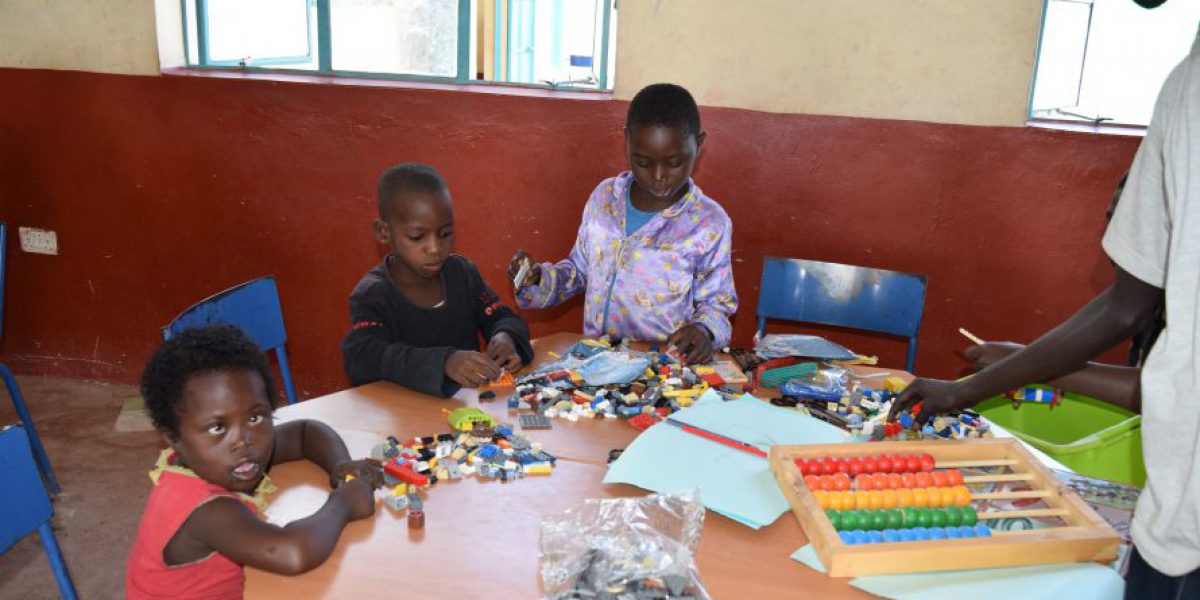Kenya: Building Self-Reliance and Promoting Inclusion of those with Disabilities in Kakuma
06 July 2017|Elizabeth Wanjiku, JRS Kakuma

Elizabeth Wanjiku has been the coordinator of the JRS Special Needs department in Kakuma refugee camp since January 2017. One of the principles that guide JRS’s work with people with special needs is the conviction that each person has potential. Through a personalized program of formation designed specifically for people with special needs, JRS staff are discovering how they can tap into this potential, to nurture and develop it. Elizabeth walks us through this process and explains how the department helps the beneficiaries integrate into society after they have left the program.
JRS believes that the inclusion of children with disabilities in the mainstream education system is a fundamental human right. Every child matters, and should not be denied their right to education nor discriminated on any basis, whether it is gender, race, or health condition.
Rooted in this vision, the JRS Special Needs department in Kakuma refugee camp is promoting inclusive education for persons living with disabilities. JRS special needs facilities are now moving away from the caretaker model as merely “feeding centers”, to an educational model that invests in a stimulating early childhood education for a good foundation and to prepare beneficiaries for the mainstream school system.
Within the department, four lead trainers oversee the identification process. They guide the team in carrying out monthly outreach in the community, as well as disseminating information on early identification and awareness of disabilities and the services provided by JRS and other partner organizations in the camp such as health facilities.
When eight-year-old Violet was admitted to one of the JRS centers, she was exhibiting several physical challenges including limited speech, psychomotor problems (weak muscle tone in the right hand) and drooling. The first step in building an action plan for Violet was to conduct a disability assessment using the updated JRS functional assessment tool.
It is the lead trainers’ responsibility to carry out the assessment, with the help of care assistants and center supervisors. One of the major challenges they face during the assessment is the language barrier. To remedy this, JRS’s recruitment strives to be representative of the camp’s linguistic diversity.
After identification and assessment, the staff draw up a task analysis for the beneficiaries. A task analysis will look at the beneficiary’s needs and strengths, parents’ expectations, as well as factors that may hinder those expectations, in order to set goals for the beneficiary and the means to achieve them. JRS believes that parental contribution is crucial to the rehabilitation of beneficiaries. To this end, parents go through rehabilitation counselling whereby they are debriefed on the rehabilitation process which helps them reconcile their expectations with expected outcomes. They also practice psychomotor activities that they can do with the beneficiaries at home.
Violet has low muscle tone on her right hand. However, she has developed good compensatory skills and uses her left hand to do most activities. For instance, she uses her mouth to dismantle Lego sets because her left hand fine motor skills are not well developed. Violet has many cognitive strengths. She recognizes color, has an awareness of patterns, can maintain good attention, and has good visual-spatial orientation. Violet’s intervention plan includes strengthening her muscle tone without losing her compensatory skills and her left hand’s ability to write, in addition to developing her fine motor skills. This involves many sessions with the occupational therapist. She will also learn basic literacy/numeracy, art and social skills as preparation for discharge to a mainstream school. After six months, Violet will go through an assessment and evaluation that will determine her suitability to be discharged into the regular schools.
During disability awareness campaigns in schools, the lead trainers help to demystify ideas about disability in order to curb stigmatization. In addition, beneficiaries discharged to these schools are followed up by an inclusion officer whose job is to promote integration by ensuring that proper accommodations are in place to support these children.
For those beneficiaries aged 10 years and above for whom formal education is not appropriate, we offer vocational training. Their admission in the special needs centers is important for socialization as they interact with others and acquire self-help skills in an age-appropriate environment. The trainings offered include tailoring and bead work for which JRS has developed curricula suitable for people living with disabilities. However, the quality of the trainings still suffers from lack of skilled trainers.
Given the harsh living conditions in the camp, parents that have to care for children living with disabilities face enormous challenges. One of the department’s objectives is to support these parents through empowerment programs. The lead trainers regularly conduct training sessions for them to increase their confidence in caring for their children. The department also organizes frequent meetings with parents where they talk about their children’s progress.
Life in a refugee camp is very hard for most people, and particularly for persons living with disabilities. The department recognizes that they need assistance the most as well as someone to journey with them and share in their struggles. Firm in their belief that every person has inherent potential, they try not only to help them cope with the challenges of life, but also to equip them with the life skills they need for self-reliance.



